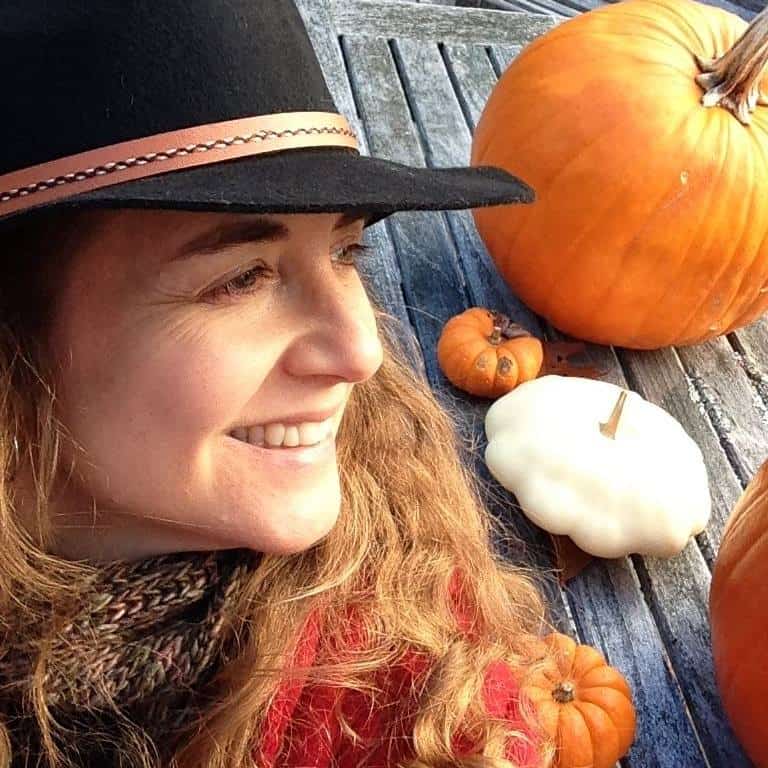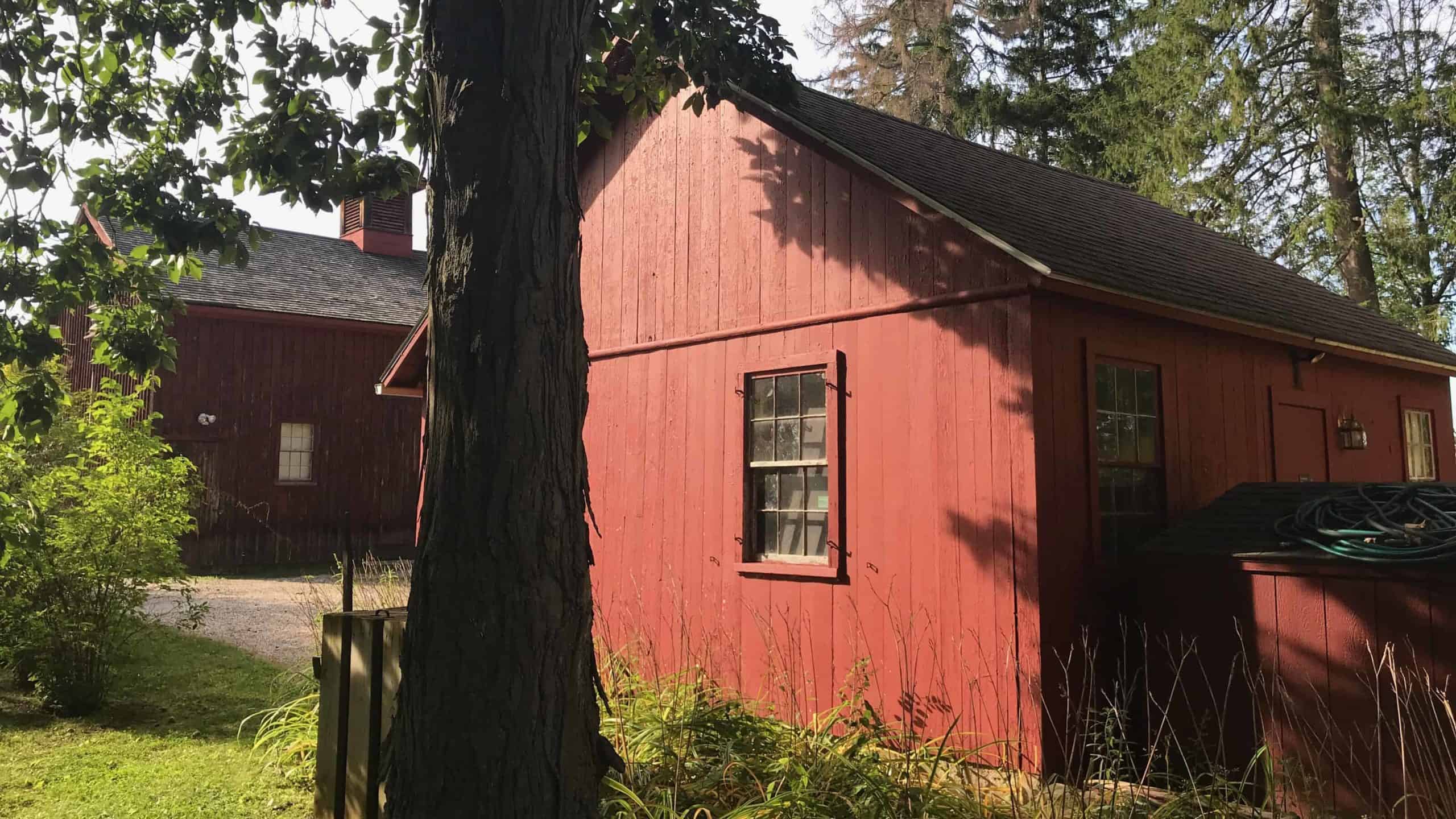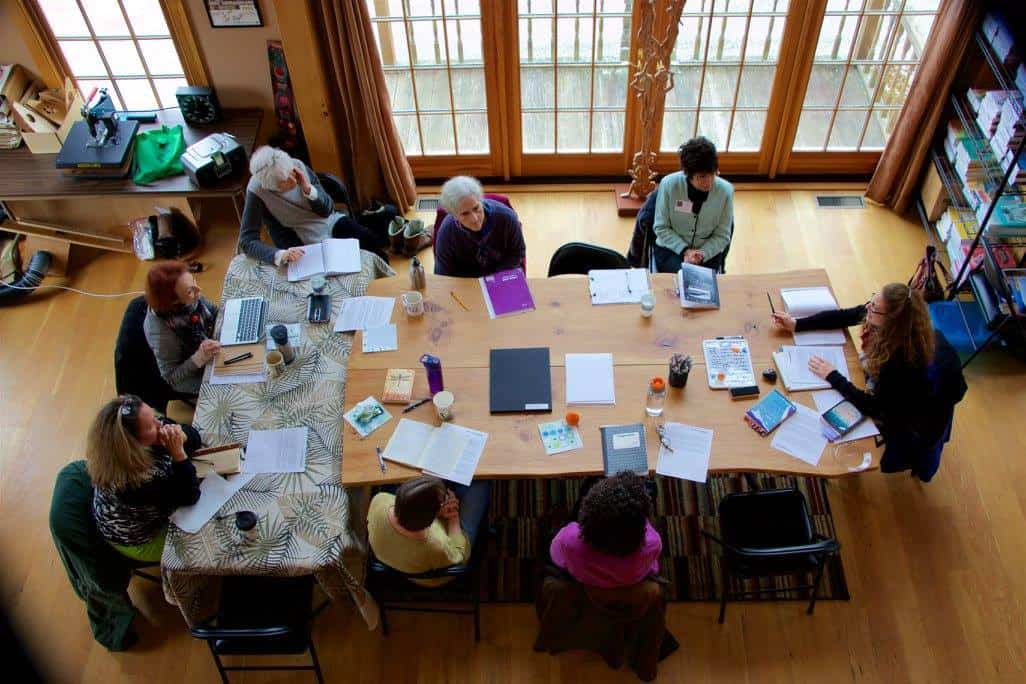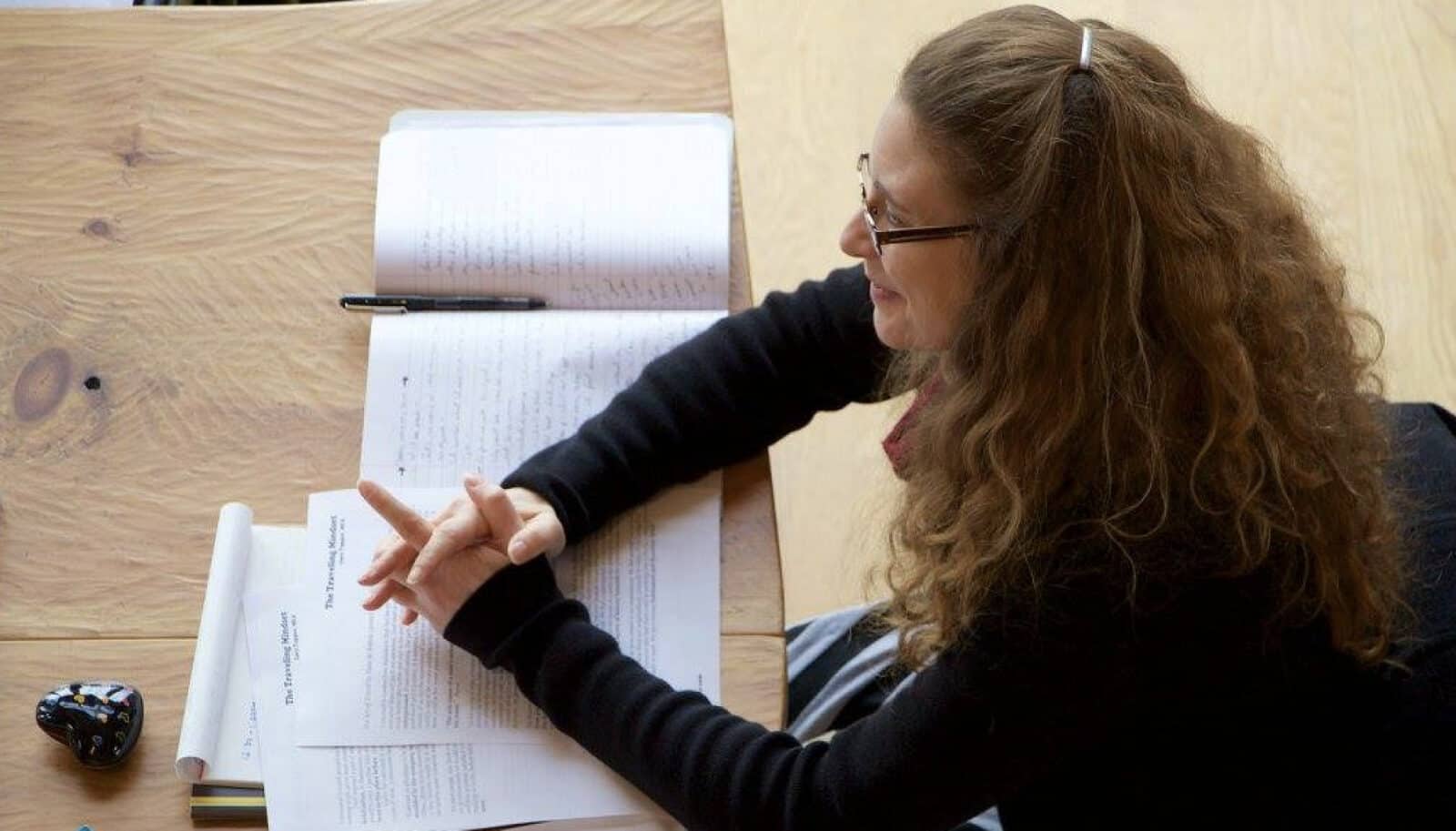‘A black bear
has just risen from sleep
and is staring
down the mountain …’
Mary Oliver imagines her moving on a raw night in early spring. In the time of year when mothers are denning, she is waking after the winter, drinking from a stream, following the water down, scratching red cedar or pine, scenting the sap.
Lara Tupper remembers the first time she heard a Mary Oliver poem read aloud. In the first yoga class she took at Kripalu, where she was teaching, someone read Wild Geese to the group as they stretched — and then she walked outside and saw geese flying.
This spring, she is bringing poetry to the hills. As an award-winning writer and novelist, world-traveling jazz and folk singer, founder of Swift Ink stories, she will lead 19 free poetry, fiction and creative nonfiction workshops this spring and summer at community centers, libraries and town halls across the county, from the hilltowns to the New York border towns, and from north to south.
“I feel like Brandi Carlile on a world tour,” she said, laughing as she looked up all the days and places. “Where am I tonight?”
She too had come down the mountain on a spring day, over the back roads — to meet over hot chocolate at Starving Artists Café in Lee. (She and her husband, singer songwriter Bobby Sweet, live in Washington, Mass., in a historic house they are restoring, with six hens in the backyard coop.)
“I’m excited about small towns,” she said, “because I live in one, and I know how exciting it is when someone comes to the local library who is new to me …”
So she will come to talk about a kind of poem or a poet or writer, read some as prompts and play with the ideas they bring, just as, this weekend, she will mull over haiku in at the Chatham Public Library.
‘I have a deep appreciation for the economy of the haiku form. It’s uncluttered. When I try to write it, I’m forced to do away with excess. That’s freeing for me.’
For this workshop, she chose a form she has studied over the years and wanted to teach, she said, and she finds them compelling in their quick, intense look at a changing season.
“I worked in Otaru, Japan when I was in my 20s,” she said, “and I certainly don’t claim to be an authority, but I have a deep appreciation for the economy of the form. It’s uncluttered. When I try to write it, I’m forced to do away with excess. That’s freeing for me.”
She will sometimes hold one verse in mind for a walking meditation — the images can help her to focus, she said, in the way they distill down to an essence and the way they see detail. They often look closely at a place and time.
‘a petal shower
of mountain roses
and the sound of the rapids’
The group will read some Japanese poets considered leaders in the craft like Basho (translated here by Robert Hass, who read his own poetry in the Berkshires a few springs ago.) Basho lived and wrote and taught in Edo in the 1600s, Haas says in his translation, and in his later years he traveled the countryside and kept a journal, and taught along the way.

Berkshire novelist Lara Tupper sits in the sun. Press photo courtesy of the artist
“Wanting to sail down the Mogami River, waited for good weather at Oishida. Here the old seed of haikai had taken root. Still bearing flowers — it brought back past times, eased the heart, ‘the clear note of a reed pipe.’”
And at their request, he sat and composed with them. Maybe they felt something, sitting with him while the river ran high with snowmelt, like the excitement Tupper has felt in her first workshops for this spring — an intention in the room.
She has already seen people come for the first workshop or two and look for more. Some people come because they love the poems, she said, and some who maybe remember reading a few years ago and feel curious … and some who want to get out and stretch (their minds).
In later workshops she will return to Mary Oliver as a muse. Oliver walks the woods and fields out near Provincetown in her verses, exploring the tip of Cape Cod along the ocean, and her sense of observation and connection move Tupper, the same way Haiku draws her to focus in.
‘… touching the grass
the cold water.
There is only one question:
how to love this world.’
“I appreciate her close eye,” she said.
And then she turns to writers even closer to home. In Scarlet Letters workshops in Pittsfield and in Lenox, she will gather writing prompts from Berkshire writers.
The name conjures Nathaniel Hawthorne and his novel of Hester Prynne, a woman living in a Puritan community 300 years ago — the scarlet letter is the ‘A’ she wears as a mark of public shame for falling in love with a man outside her abusive marriage.
When Tupper first came to the Berkshires, she did not know that Hawthorne wrote the book just before he and his family came to live in Lenox for a year. (He wrote The House of Seven Gables there, in an old red cottage now on the grounds of Tanglewood).

Herman Melville wrote Moby-Dick at Arrowhead, his historic house and former farm in Pittsfield.
Before the pandemic, Tupper often walked in the same woods. She taught for some years at Kripalu, she said, and she would walk the grounds there that once were Shadowbrook (the Gilded Age estate of Andrew Carnegie).
She learned that Hawthorne had lived a quarter of a mile away. And she would imagine how he might have felt then, living and writing on the land, as Hesther takes a walk in the woods with her daughter.
‘… (she) did actually catch the sunshine, and stood laughing in the midst of it, all brightened by its splendour, and scintillating with the vivacity excited by rapid motion.’
‘… (she) did actually catch the sunshine, and stood laughing in the midst of it, all brightened by its splendour, and scintillating with the vivacity excited by rapid motion.’ — Nathaniel Hawthorne
Tupper became curious about Hawthorne friendship with Herman Melville and its unexplained ending, and about W.E.B. DuBois and Edith Wharton, contemporaries born around the Civil War … DuBois grew up here in Great Barrington and emerged onto the international scene with Souls of Black Folk in 1903, as Wharton was writing House of Mirth and taking her first flight as a novelist in Lenox.
So in this workshop, Tupper will touch on what they have written here, and how they think about this place.
“I’m interested in how the Berkshires holds all these stories and all these mysteries,” she said.
She hopes to create spaces where writers and readers can come together to talk. Looking back to a memoir gathering in Huntington, earlier in the spring, she recalls the excitement and sense of open connection, when people allow themselves to be honest together and share their stories.
She remembers living in New York City, in a community of people who would come to readings at independent bookstores, coffee shops, open mics.
‘We supported one another. I felt like part of a group of people who wanted to draw attention to new works, and especially to women writers.’
“It was an exciting scene to be part of for awhile,” she said. “We supported one another. I felt like part of a group of people who wanted to draw attention to new works, and especially to women writers. We would all feel that way — ‘I’ll spread the word people have new books coming out, because I genuinely like what you do.’”
She has always loved going to readings, she said, and talking with people who love books, talking with people about what they read, what they write, what they love. And though she finds sometimes a challenge in draw people out to readings and writing workshops here, she feels kind of a group can happen anywhere.
And right now, the voices of poets feel timely to her. She turns to Mary Oliver for her attention to the natural world and her expression of clear detail — reminding people of sounds they knew familiarly and have forgotten, inviting people to see and feel the world around them.
“David Whyte calls her a poet of greatest compassion,” she said. “I think we need more of that right now.”
‘David Whyte calls Mary Oliver a poet of greatest compassion. I think we need more of that right now.’

Berkshire novelist Lara Tupper talks with writers in a workshop. Press photo courtesy of the artist
These 19 classes are supported by local cultural councils and the Massachusetts Cultural Council.

